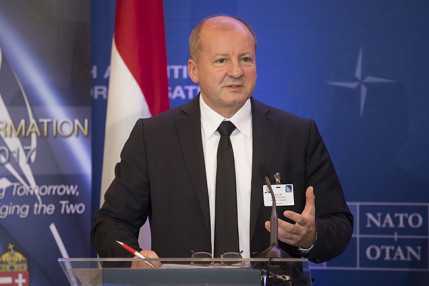István Simicskó: Hungary Also Wants to Shape Common Security
Szöveg: honvedelem.hu / MTI | 2017. március 23. 15:30Speaking at a joint press conference held on Thursday, the second day of the NATO Transformation Seminar, Minister of Defence Dr. István Simicskó emphasized that “we, Hungarians are committed when it comes to our NATO membership…and we also want to shape our common security.”

István Simicskó pointed out that it is very important to increase the defence budget. This does not only mean that Hungary spends more, because it would also like to spend better and more efficiently, so at least 20 per cent of the defence budget should be allocated to the development of the capabilities of the Hungarian Defence Forces, the minister announced.
The minister of defence noted that the government of Hungary had earlier made a decision to increase the defence spending so that it can reach two per cent of the GDP by 2026. In addition, the government has already formulated a financial plan to achieve this proportion as early as by 2022. He also said that Hungary has launched a national defence and armed forces development program, whose objectives are in line with NATO concepts and the new national security and military strategies are being prepared by the same principles.
NATO Deputy Secretary General Rose Gottemoeller said that the Alliance faces serious and evolving challenges to which it must give adequate responses. She added that for this reason, in her opinion, the Alliance “started to move in the right direction, when “in 2014 NATO allies restated their commitment to stop the cuts in defence spending and spend two per cent of GDP on defence within a decade".

The Deputy Secretary General welcomed Hungary’s “commitment to its spending 20 per cent of its defence expenditures on major investment and development in this year. She went on saying that “Hungary is a key ally with troops serving in NATO missions in Afghanistan and in Kosovo and Iraq, and for that we are very grateful and appreciative. Hungary is committed to our collective defence here in Europe."
The Deputy Secretary General pointed out that NATO needs to adapt to constant challenges in the world, adding that “we have been implementing the largest reinforcement to our collective defence since the Cold War…Today we face a more assertive Russia, along with turmoil and terrorism coming from North Africa and the Middle East". In addition to the threat of terrorism, NATO must also respond to the challenges of cyber warfare. In answer to a question she said that “last summer at the Warsaw Summit cyber was created as an operational domain for the NATO Alliance", and noted that the NATO Cooperative Cyber Defence Centre of Excellence was founded in Estonia.
Speaking about this issue, István Simicskó also emphasized that Hungary gives priority to being ready to tackle the threats and challenges presented by the cyberspace, and is planning to set up a cyber defence centre as part of the Military National Security Service.

István Simicskó told the press that he had paid a visit to the Allied Command Transformation in Norfolk last year, which is the organization responsible for strategy, analysis and planning in NATO. As he pointed out, strategic thinking is of vital significance, so that we can identify the challenges of our age and the threats posed to our country and its citizens. In identifying and responding to these threats, it is important that instead of being alone, we can tackle these challenges as a member of the strongest military alliance in the world, the minister explained.
The minister of defence said it was a privilege that NATO has decided to bring its two-day Transformation Seminar to Budapest to discuss here the security challenges of the future.
At the press conference, Gen. Denis Mercier, Supreme Allied Commander Transformation (SACT) said that a key topic of the two-day conference was the future of the Alliance, because NATO must adapt its posture in order to make sure that it can respond to the challenges of the future. As the general said, “we are in a very complex world, and in this complex world, no nation or organization in itself has all the answers, so we acknowledge the necessity to deal with security with a wide range of partners. I do not only mean partner nations, but also “think tanks", people coming from various horizons in order to help us think differently", to think “out of the box".

Photos by Veronika Dévényi